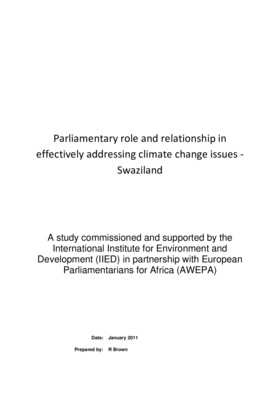Parliamentary role and relationship in effectively addressing climate change issues - Swaziland
Climate change is defined as any long-term and significant change in the expected patterns of a specific region‟s average weather for an appropriately significant period of time. It is the result of several factors, including Earth‟s dynamic processes, external forces, and more recently, human activity. External factors that shape climate include such processes as variations in solar radiation, deviations in Earth‟s orbit, and variations in the level of greenhouse gas concentrations. Evidence of climatic change taken from a variety of sources can, in turn, be used to reconstruct past climates. Most climate evidence is inferred from changes in key climate indicators, including vegetation, ice cores, dendrochronology, sea-level change, and glacial geology.~Climate change represents one of the greatest environmental, social, and economic threats facing the planet today. In developing countries, Swaziland included, climate change will likely have a significant impact on the livelihoods and living conditions of the poor. It is a particular threat to the attainment of the Millennium Development Goals (MDGs) and progress in sustainable development in Sub-Saharan Africa. Increasing temperatures and shifting rain patterns across Africa reduce access to food and create effects that impact regions, farming systems, households, and individuals in varying ways. Additional global changes, including changed trade patterns and energy policies, have the potential to exacerbate the negative effects of climate change on some of these systems and groups.
Cite this publication
Available at https://www.iied.org/g03058
